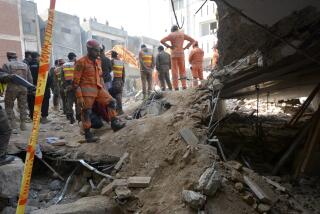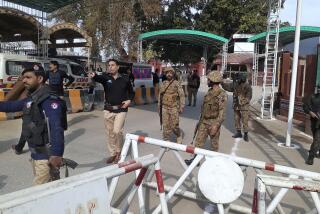20 Held in Pakistan Amid London Bombings Inquiry
- Share via
ISLAMABAD, Pakistan — Security forces in Pakistan said they detained 20 people belonging to various militant groups Tuesday and were questioning some of them concerning suspected links to the July 7 London bombings.
The action comes as British investigators increasingly focus on determining who outside Britain may have planned or facilitated the attacks on the transport system, which killed at least 52 people as well as the four bombers. About 700 people were injured.
Besides the detentions in Pakistan, an Egyptian biochemist is being held and interrogated in Cairo. The man, Magdy el-Nashar, knew at least one of the bombers, and authorities reportedly found chemicals that could be used in explosives during a search of El-Nashar’s apartment in Leeds, England.
British authorities have not identified the biochemist as a suspect, and Egyptian authorities have said they are convinced he was not involved in the attacks.
The Egyptian Cabinet issued a statement Tuesday that seemed to exonerate El-Nashar. “The Cabinet ... took note of the report by the Interior Ministry which clarified that the Egyptian chemist had no link with the Al Qaeda organization or with the bombings,” the statement said, according to news reports.
In London, Prime Minister Tony Blair met with 25 Muslim leaders, political leaders and members of Parliament to discuss what actions could be taken to stem the spread of extremism among disaffected Muslim youths.
After what are believed to be the first suicide attacks on British soil, which police say were carried out by three Britons of Pakistani descent and a Jamaican-born convert to Islam, authorities have expressed concern that a small number of youths in the 1.6-million-strong Muslim community are vulnerable to recruiting by militant groups.
At the meeting, the Muslim leaders pledged to reach out to young people and discourage extremist ideas in their community.
“There was clear determination, a clear commitment from all of us to really find those measures which will enable us to deal with the crisis,” said Iqbal Sacranie, secretary-general of the Muslim Council of Britain.
Speaking to the BBC after the session, Sacranie said it was “absolutely vital” that the Muslim community serve as part of the solution.
However, even before the meeting took place, a militant Muslim spokesman said it was useless for Muslims to talk to the British government unless it pulled its troops out of Iraq and made other policy changes.
Anjem Choudary, a lawyer and activist, said there was a “very real possibility” of another terrorist attack. “You can’t sit down and negotiate while you [Westerners] are murdering Muslims in Iraq,” he warned.
London-based radical Syrian cleric Sheik Omar Bakri Mohammed, the founder of the now-dissolved militant group Al Muhajiroun, told the Evening Standard newspaper in his first interview since the bombings that he deplored violence but Britain had brought the attack upon itself.
“The British people did not make enough effort to stop its own government committing its own atrocities in Iraq and Afghanistan,” the cleric, who has praised Osama bin Laden in the past and hailed the Sept. 11 attacks in the United States, was quoted as saying.
Britain has been criticized by European security officials for tolerating militants such as the Syrian-born cleric, letting them put down roots in Britain and exhort followers to wage attacks against the West.
At a news conference in London, Blair and visiting Afghan President Hamid Karzai vigorously rejected the argument by a British think tank Monday that Britain had become a target for Al Qaeda and similar groups because of the country’s role in the Iraq war.
“Of course these terrorists will use Iraq as an excuse. They will use Afghanistan.... They will always have their reasons for acting. But we have got to be really careful of almost giving in to the perverted and twisted logic with which they argue,” Blair said.
“The terrorists are only after human life,” Karzai said.
“They feel happy when they cause suffering in Afghanistan, when they cause suffering in Britain, when they cause suffering elsewhere,” he said.
A poll published Tuesday in the Guardian newspaper showed that many Britons were convinced that their nation’s participation in the Iraq war had galvanized would-be terrorists.
According to the poll, 33% thought Blair bore “a lot” of the blame for the London bombings for deciding to go to war, and 31% “a little.” Only 28% thought that there was no connection between the bombings and the Iraq war, the newspaper said, based on a poll of 1,005 adults conducted over the weekend.
Pakistani authorities said Monday that three of the bombers, Shahzad Tanweer, Mohamed Sidique Khan and Hasib Hussain, had traveled to Pakistan late last year, returning to Britain in February. Investigators are working on a theory that during those months the three may have met with Al Qaeda-linked figures and may have been planning or received training for the London bombings.
In Lahore on Tuesday, Police Chief Tariq Saleem said that some of those detained were being questioned about possible links to the London bombings. But police spokesman Ather Ahmed later clarified that Saleem was not saying that investigators had found evidence linking the detainees to the attacks.
Suspected militants have been taken in for questioning in Karachi, Lahore, Faisalabad and Pakpattan.
In the port city of Karachi, police said they arrested three members of Harkat-ul-Mujahedin al-Almi, a group linked to Al Qaeda that has been blamed for several terrorist attacks, including an attempt to assassinate President Pervez Musharraf.
Karachi police said they also sealed the offices of three publications accused of inciting religious hatred.
Police in Islamabad, Pakistan’s capital, raided two mosques but failed to arrest the imams, who went underground. In neighboring Rawalpindi, police closed the office of Al Qalam magazine, which is published by the banned militant group Jaish-e-Muhammad.
Police said the crackdown, ordered by Musharraf after the London bombings, would continue.
The London Underground said Tuesday that service on two of the three damaged lines could be back to normal within two weeks, the BBC reported. Police accompanied by dogs trained to sniff for explosives have begun patrolling the transit system to deter attacks.
Special correspondent Zaidi reported from Islamabad and Times staff writer Daniszewski from London. Times staff writers Paul Watson in Islamabad and Janet Stobart in London contributed to this report.
More to Read
Sign up for Essential California
The most important California stories and recommendations in your inbox every morning.
You may occasionally receive promotional content from the Los Angeles Times.










